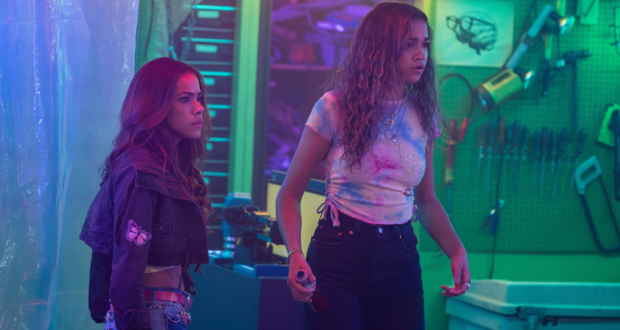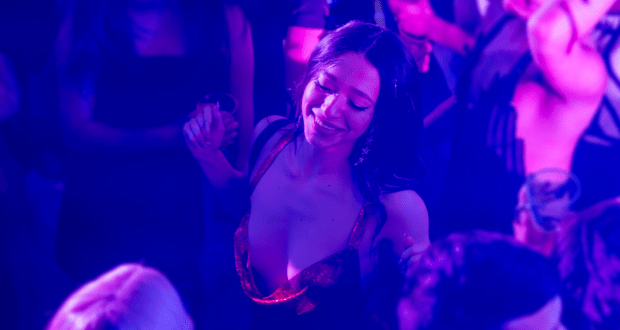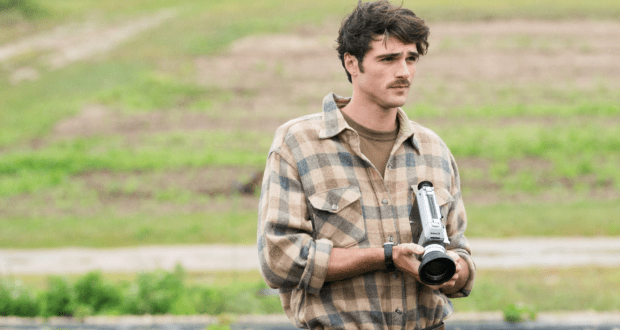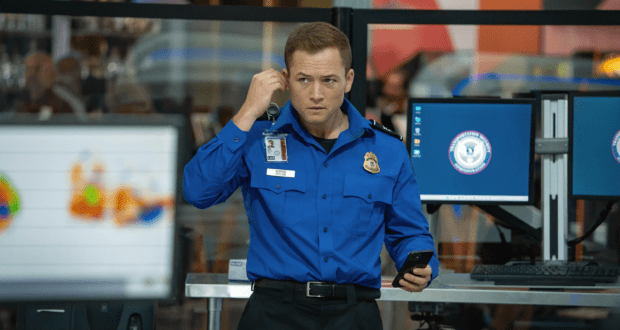With its ambitious mix of science fiction and slasher horror, Time Cut aims to deliver a thrilling, time-bending twist on the traditional slasher genre. Directed by Hannah MacPherson and co-written by MacPherson and Michael Kennedy, this film stars Madison Bailey as Lucy Field, a high school senior who uses a makeshift time machine to travel back to 2003 to save her sister from a gruesome murder. Yet, despite a compelling premise, the film ultimately feels overly derivative of Totally Killer (2023) — a movie with an almost identical concept of time-traveling to prevent a murder in the past. This lack of originality, coupled with inconsistent pacing, predictable plot developments, and underdeveloped characters, holds Time Cut back from reaching its potential.
Premise:
Time Cut introduces Lucy Field (Madison Bailey), an inventive but isolated high school senior struggling with the trauma of her older sister Summer’s murder. Obsessed with the crime, Lucy spends her time tinkering with gadgets in her garage-turned-laboratory, hoping to understand what happened on that fateful night in 2003. While her grief feels palpable, Lucy’s character arc is disappointingly shallow, with her motivations simplified to her connection with her sister. This emotional depth gets lost amid the chaotic plot twists and genre clichés that unfold.
When Lucy accidentally activates a time machine she built, she’s transported back to 2003, just days before her sister’s murder. This setup offers initial intrigue, especially as Lucy witnesses the quirky, early-2000s fashion, music, and technology, bringing a nostalgic element to the film. Unfortunately, the script relies on shallow nods to the past without delving deeper into the era or using it to build tension.
Performances:
Madison Bailey does her best as Lucy, delivering a performance that leans into her character’s determination, vulnerability, and courage. However, the role lacks enough emotional range, which prevents the audience from truly connecting with her journey. Antonia Gentry plays Summer, whose relationship with Lucy is central to the plot but is never fully explored. Their bond is largely conveyed through one-dimensional flashbacks and brief interactions, which do little to deepen their dynamic.
Quinn (Griffin Gluck), is an unnecessary addition to the storyline, mainly existing to add a few humorous moments. The lack of chemistry between the characters feels even more strained given Quinn’s shallow backstory and function as a stereotypical “nerdy but charming” sidekick. Supporting characters like Gil (Michael Shanks) and Kendra (Rachael Crawford) are thinly written and serve primarily as plot devices to guide Lucy through her journey.
Lack of menace:
Time Cut attempts to provide a slasher experience, complete with an enigmatic killer stalking the characters. The film’s killer, however, is woefully underwhelming, lacking both menace and a distinctive backstory. The kills, although creative in setup, come across as tame and uninspired due to overly cautious editing and quick cuts that undermine any potential for genuine horror. In a genre known for its inventive deaths and dark humor, Time Cut feels almost sanitized, shying away from the gore and suspense that would lend credibility to its slasher label.
Way too similar to Totally Killer:
A glaring flaw in Time Cut is its resemblance to Totally Killer. Both films revolve around time-traveling back to a past decade to prevent a family member’s murder. Totally Killer managed to infuse its story with humor and self-awareness, playing up the absurdity of slasher tropes and balancing tension with witty commentary. By contrast, Time Cut struggles to find its own voice, leaning too heavily on the same premise without bringing a unique perspective. This lack of originality stands out painfully, and it’s difficult not to compare the two, especially given how Totally Killer succeeded in areas where Time Cut falters.
Poor pacing:
Another flaw lies in its pacing. The first half of the movie drags with prolonged scenes of exposition that add little to the story, while the latter half tries to pack in too many twists and turns. This uneven structure leaves the audience feeling disoriented, as crucial scenes are rushed or glossed over to make room for unnecessary filler. For a film centered on the urgency of preventing a murder, there’s a surprising lack of tension or momentum pushing the story forward.
Lucy’s journey back in time is handled in a way that feels more like a plot device than a genuine exploration of the consequences of time travel. Opportunities to explore the mechanics and limitations of her time machine are ignored, leaving the sci-fi element feeling flat. This oversight diminishes the stakes, as there’s little sense of what she truly risks by changing the past or what ramifications her actions could have in the present.
Direction and tone:
Hannah MacPherson’s direction is competent but lacks flair. The film’s visuals and production design fail to evoke the atmosphere necessary for a time-travel slasher. Scenes in 2003 have minimal visual distinction from the present day, undermining the nostalgic impact and time-travel premise. More creative cinematography could have accentuated the contrast between the two timelines, drawing viewers into Lucy’s mission.
The film’s tone is also inconsistent. While Totally Killer embraced a tongue-in-cheek approach, Time Cut vacillates between lighthearted moments and earnest attempts at horror, ultimately succeeding at neither. As a result, the movie fails to create a cohesive atmosphere that could have enhanced its impact on the viewer.
Overall:
Time Cut is ultimately a forgettable entry in the horror genre, marred by its lack of originality and missed potential. Madison Bailey’s commendable efforts and the intriguing premise are wasted in a derivative plot that pales in comparison to the superior Totally Killer. The film’s time-travel mechanics and slasher elements feel underdeveloped, and the pacing issues make it difficult for viewers to fully immerse themselves in the story.
-
Acting - 4/10
4/10
-
Cinematography/Visual Effects - 4/10
4/10
-
Plot/Screenplay - 2/10
2/10
-
Setting/Theme - 3/10
3/10
-
Watchability - 4/10
4/10
-
Rewatchability - 1.5/10
1.5/10












